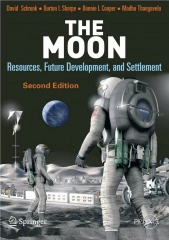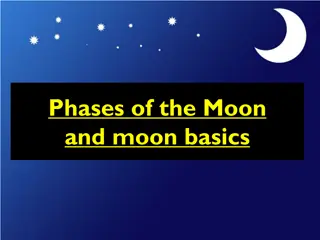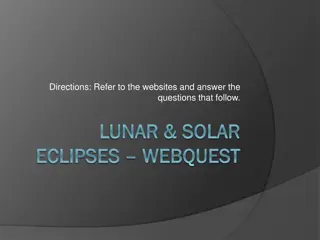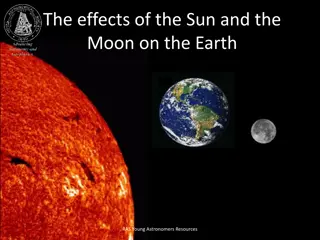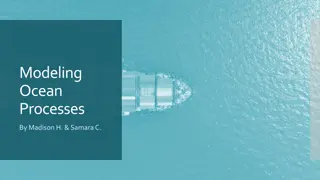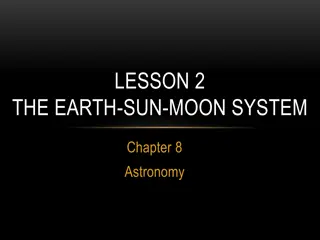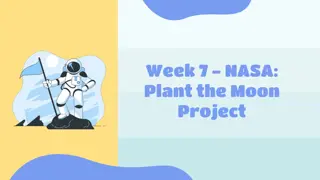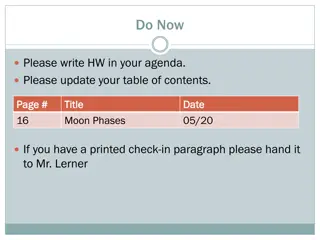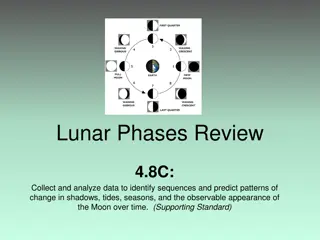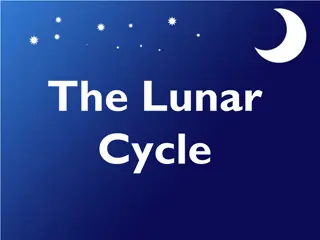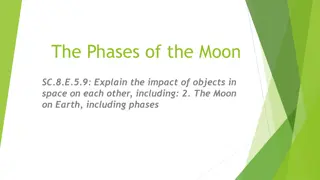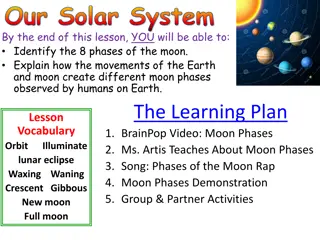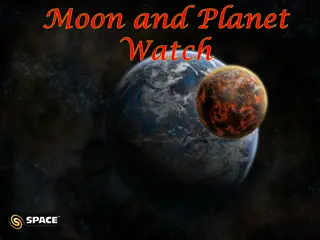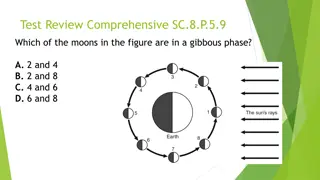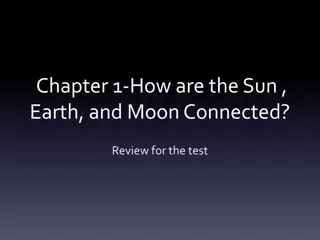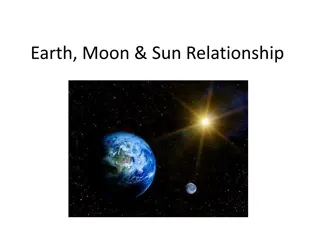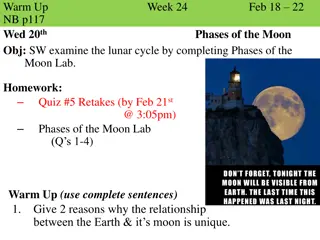Exploring the Wonders of the Moon
Discover interesting facts about the Moon, including its distance from Earth, rotation, surface features like craters, and its impact on tides. Learn why the Moon's appearance changes, explore moon phases and tides through engaging animations, and understand the gravitational influence that causes tides. Dive into diagrams illustrating the Moon's phases, from the New Moon to the Waxing Crescent, shedding light on the celestial body that captivates us all.
Download Presentation

Please find below an Image/Link to download the presentation.
The content on the website is provided AS IS for your information and personal use only. It may not be sold, licensed, or shared on other websites without obtaining consent from the author.If you encounter any issues during the download, it is possible that the publisher has removed the file from their server.
You are allowed to download the files provided on this website for personal or commercial use, subject to the condition that they are used lawfully. All files are the property of their respective owners.
The content on the website is provided AS IS for your information and personal use only. It may not be sold, licensed, or shared on other websites without obtaining consent from the author.
E N D
Presentation Transcript
What is the Moon? A large rock that orbits a planet The Earth has 1 moon Moons orbit planets Planets orbit the sun
Moon Facts The moon is 240,000 miles from Planet Earth. The moon rotates counterclockwise. There are holes on the moon s surface called craters. The moon gets its light from the reflection of the sun.
Why doesnt the moon look the same? As the moon orbits around the earth, the light from the sun shines on it. From earth, we can only see certain portions of the lit moon. It takes 1 month, approx. 29 days, for the moon to completely orbit the Earth.
Animation of the Moon Phases Moon Phase Animation Throughout a month, the moon s position changes & we can only see some parts of the illuminated moon.
The Moon Causes Tides Tides are caused by the gravitational pull of the moon. There are two types of tides: High & Low High tide occurs twice a day.
Tide Images High Tide Low Tide
Diagram of the Moon Phases The sun is always shining on the moon. From earth we can only see certain parts of the moon that are lit by the sun.
Diagram of the Moon Phases http://t2.gstatic.com/images?q=tbn:hO4qv4jXMDIXtM:http://www.edupic.net/Images/ScienceDrawings/new_moon.gif NEW MOON The moon is lit by the sun. However, the lit side of the moon cannot be seen from Earth. The moon appears black during the NEW MOON PHASE.
Diagram of the Moon Phases The moon is lit by the sun. We can only see a small portion of the lit moon from Earth. It is called a WAXING CRESCENT. http://t0.gstatic.com/images?q=tbn:Ko3AUdB5mUKi5M:http://weblog.takayuki-astro.com/images/080731.jpg WAXING CRESCENT
Diagram of the Moon Phases The moon is lit by the sun. We can see half of the lit moon from Earth. It is called a WAXING HALF MOON or a FIRST QUARTER MOON. http://t2.gstatic.com/images?q=tbn:OtaSONh9QLkxKM:http://reductionism.net.seanic.net/brucelgary/AstroPhotos/MoonPhases/B_001005_215845b%26w.jpg WAXING HALF MOON (1ST QUARTER)
Diagram of the Moon Phases The moon is lit by the sun. We can see a lot of the lit moon from Earth. It is called a WAXING GIBBOUS. http://t2.gstatic.com/images?q=tbn:8u9eintqbpq4lM:http://www.hrastro.com/WaxingGibbous_Moon/WaxingGibbousMoon_1500x1800.jpg WAXING GIBBOUS
Diagram of the Moon Phases The moon is lit by the sun. We can see the entire lit moon from Earth. This is the FULL MOON phase. http://t2.gstatic.com/images?q=tbn:8VRywGF1JNfHNM:http://upload.wikimedia.org/wikipedia/commons/b/b3/Full_moon.jpeg FULL MOON
Diagram of the Moon Phases The moon is lit by the sun. We can see a lot of the lit moon from Earth. This phase is called the WANING GIBBOUS. http://t3.gstatic.com/images?q=tbn:sFFH26Fw4FC3qM:http://www.galacticimages.com/catalog/images/WaningGibbousMoon.jpg WANING GIBBOUS
Diagram of the Moon Phases http://t2.gstatic.com/images?q=tbn:iMmifnBzHFhHnM:http://www.air-and-space.com/Moon/20061014%2520last%2520quarter%2520Moon%2520l.jpg WANING HALF MOON (LAST QUARTER) The moon is lit by the sun. We can see half of the lit moon from Earth. This is known as the WANING HALF MOON or LAST QUARTER.
Diagram of the Moon Phases http://t3.gstatic.com/images?q=tbn:qus3VCC3xVx5VM:http://www.air-and-space.com/Moon/20061015%2520waning%2520crescent%2520Moon%2520l.jpg WANING CRESCENT The moon is lit by the sun. We can only see a small portion of the lit moon from Earth. This is called the WANING CRESCENT.
Lets look at the phases all together: What does WAXING mean? What does WANING mean? What is a CRESCENT? What is a GIBBOUS?
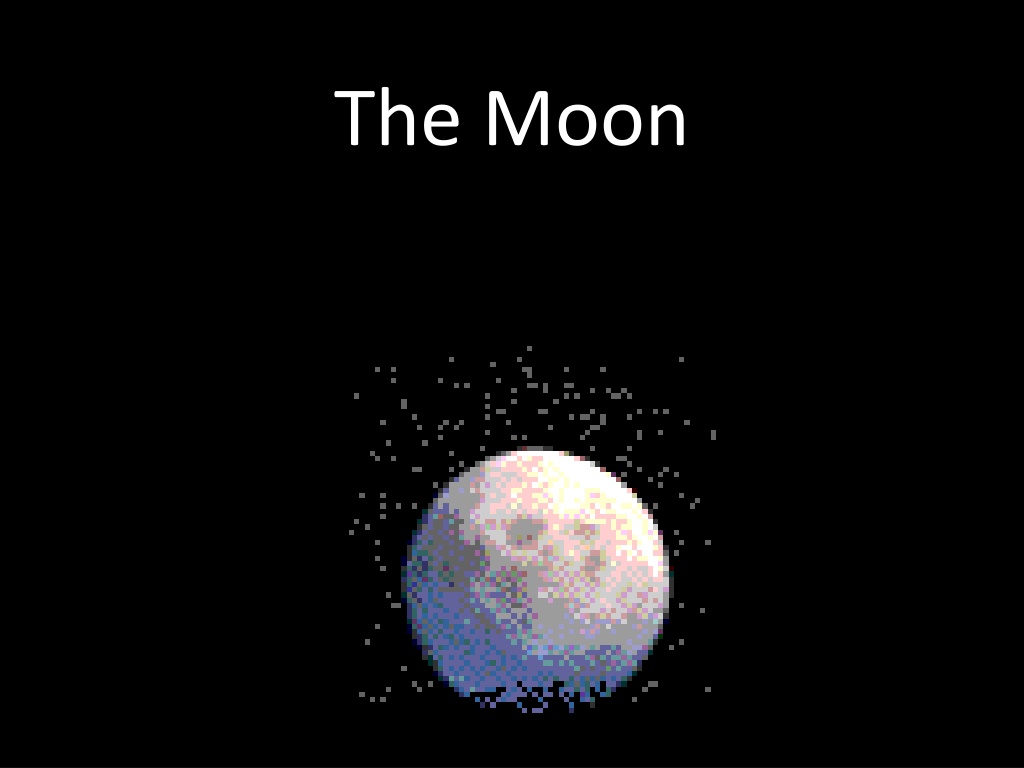



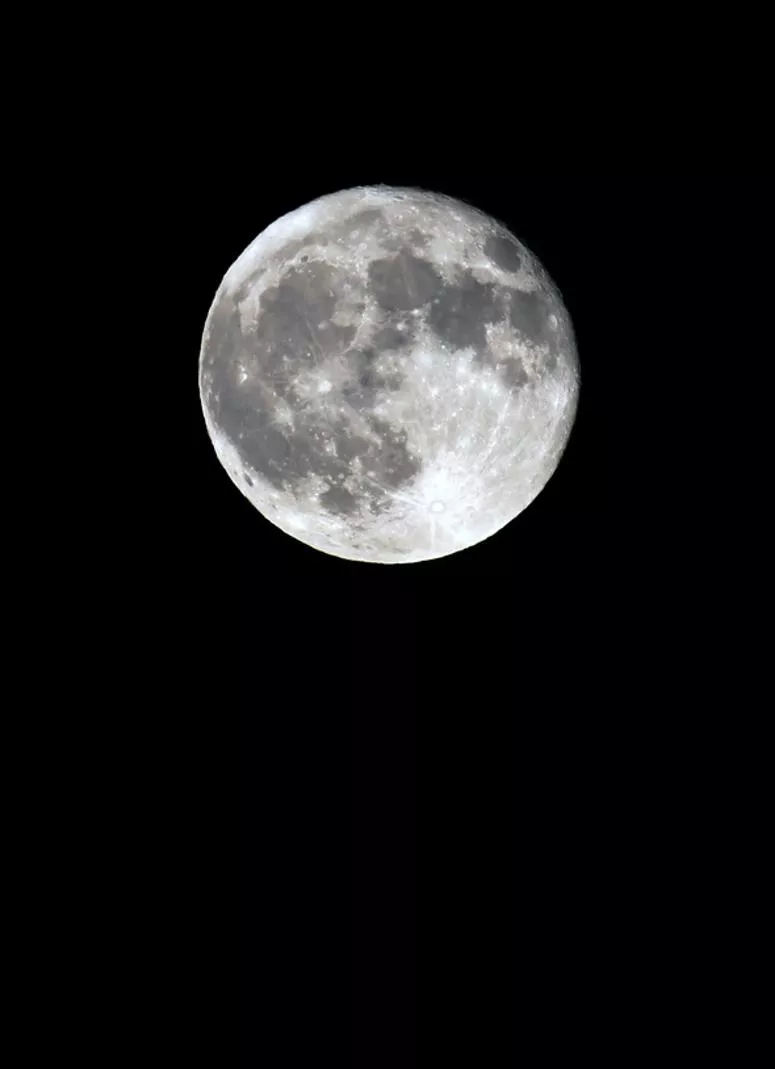

![Read⚡ebook✔[PDF] Io After Galileo: A New View of Jupiter's Volcanic Moon (Sprin](/thumb/21612/read-ebook-pdf-io-after-galileo-a-new-view-of-jupiter-s-volcanic-moon-sprin.jpg)
